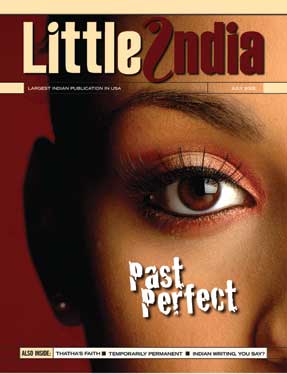Letters
Letters: August 2008

Feedback on nostalgia and overseas Indian writers.
|
“Aye Mere Bhichhade Chaman” by Shekhar Deshpande (July 2008) made me so nostalgic. It captured well the inner struggles and tugs we immigrants ever so often experience. But it is easy to forget that the world we left behind 20, 30 years ago is gone, not just because we moved here, but it is gone from India as well. The quote you ran at the end of the magazine from Beryl Pfizer,” People get nostalgic about a lot of things I don’t think they were that crazy about the first time around,” says it well. The fact is that most of us came to America decades ago because everything we are so nostalgic about now didn’t seem all that great then. Nevertheless, I enjoyed the article. Shekhar Deshpande had me humming all those favorite Manna Dey and Mohammed Rafi songs all week with your wonderfully nostalgic piece “Aye Mere Bichhade Chaman,” (July 2008). Many of these I have not thought about in decades, but the floodgates of memory were opened by your article. As a whole family, we have had such a wonderful time reminiscing about the 1980s, when we left India. And even our teenage daughters, born and brought up in America, are enjoying sharing the experience. Little India truly touches the cords of both first and second generation Indians in America. I hope you will publish more of these reflective pieces in the magazine. The article “How Indian is Indian Writing in English?” by Abhinav Maurya (July 2008) raises some very provocative questions. But I am not sure I got as straight an answer. As Indian writing becomes popular abroad, I think it is losing its Indian character. Its subjects and its audience is so far removed from the lives of Indians that is no longer Indian even if its Indian writing by virtue of the origins of its authors. Raja Rao was an expatriate writer (“How Indian is Indian Writing in English,” July 2008). He lived in France and then in Austin, Texas, until he passed away in July 2006, although he returned to India frequently. Several of his books were published by foreign book houses.
The article on Indian Writers living abroad “How Indian is Indian Writing in English” (July 2008) wrongly mentions me as sometimes living in India. In fact, I only reside in India and consider it a matter of pride that I don’t own a passport nor do I wish foreign readers to buy my work. Further, I never attend literary events of any kind, don’t do readings or book launches, and not only have I never “lamented” the lack of conventions in India, I hate such events as a prostituting of literary talent and am vehemently opposed to them. I consider the mention in the article in this context to be tantamount to defamation and it grossly offends my personal principles. Clearly, the author of the article has not done his research and checked his facts. “Thatha’s Faith” by Murali Ba-laji was a touching tribute to not just a wonderful man that his grandfather was, but the generation he represented. Many immigrants who become U. S. citizens are required to recite the pledge of allegiance. To my knowledge, the United States is the only country in the modern world which practices recitation of the pledge of allegiance in schools, sports events and other social gatherings. Most people who recite the pledge hardly understand the meaning of it just like many of us recite prayers routinely without grasping their deeper meaning. Perhaps the pledge of allegiance is a remnant of old British colonialism when subjects were asked to pledge their allegiance to the monarch. Also, in wars soldiers are asked to pledge allegiance to their armies so that they will not defect or act like traitors. It is called “brain conditioning.” But in the modern world pledge of allegiance has no place, since the world is becoming a global village. If the U.S. government wants foreigners to take an oath by reciting the pledge of allegiance, it is discriminatory; also terrorist acts have mostly been carried out by people who are born here. One does not display patriotism by wearing flag pins or waving flags in parades or reciting pledge of allegiance. True patriotism is ingrained in one’s heart and it can only be displayed by compassion and love for fellow citizens. |

